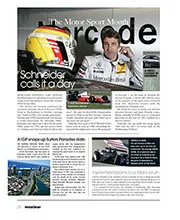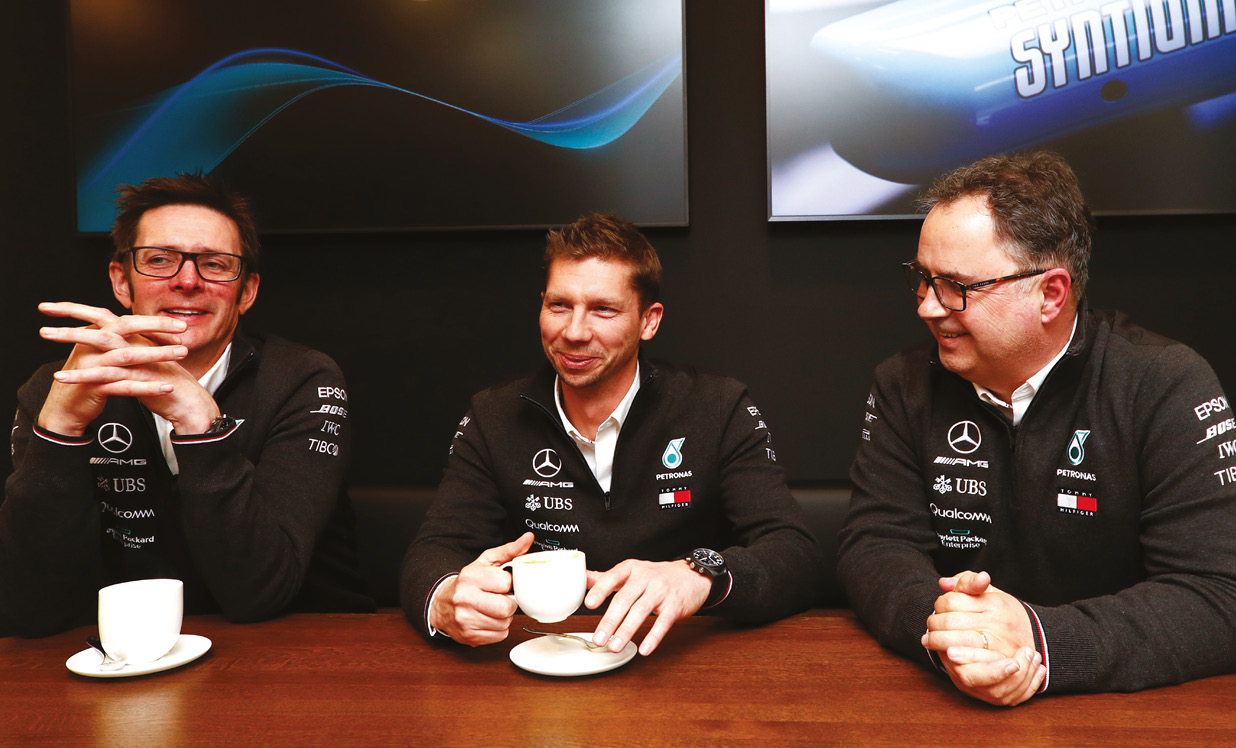
Toyota hybrid points to Le Mans return
Toyota appears to be gearing up for a return to the Le Mans 24 Hours. Rumours that Toyota’s petrol-electric hybrid technology is already being run in an LMP1 test hack…
Team manager Ron Meadows, chief strategist James Vowles and chief race engineer Andy Shovlin are a tight-knit pitlane unit at the core of extracting the maximum in-the-field performance from whatever car the Mercedes technical departments has provided. For almost two decades they’ve been at Brackley together living the intermittent promise but ultimate misery of the BAR and Honda years, through the unlikely glory of Brawn – having more than once had possible team oblivion staring them in the face – then onwards to the building of Mercedes. This marks their 18th season together.
Ron is the sanguine old hand, seen it all, quick with the Liverpudlian quip. James is part bright academic, part crazy biker, easily amused, deeply competitive. ‘Shov’ is professorial, articulate but very funny beneath the slightly shy exterior. All are emotionally intelligent, warm, likeable. It’s a nice group of people, much more than just the sum of their professional abilities.
Their knowledge of and long experience with each other is very much part of the operational strength of Mercedes. Here’s how they see it.

Andy Shovlin “Having gone through the tough times, like when Honda pulled out, is really good for galvanising the team. It helps you function as a group through different problems. It helps especially when you’re under pressure making decisions.”
James Vowles “The 2007s, ’11s and ’12s built us into who we are today. It didn’t pull us apart but strengthened us. It’s painful when you’re not performing at the level you want to. Into the good years of 2014 onwards we always remained grounded because we remembered how bad it could be. You don’t have such huge emotional swings between things going well and not so well. Because you remember when it was terrible.”
Ron Meadows “The biggest struggle was 2007 – then Honda pulling out at the end of ’08. It was mentally very tough. We lost almost half the team and that was very emotional as we were losing friends, laying some of them off and then going racing. We’ve always been strong as a group and there’s never really been a blame culture. People just know what’s expected of them and we’ve been fortunate that a good group has come together. As we’ve got more experienced we’ve made better decisions. From the offset it was never it must be you or him, or who has let us down. The stars just aligned.”
AS “There are races we’ve won and you’d have thought that we’d finished 11th because of the amount we did wrong, what we need to do better, where we’ve tripped up – the near misses or the things that go wrong. You treat them the same as that’s the only way you improve… It’s a bit sad because, before the team was successful, you imagined that winning would be more enjoyable. But it becomes more of a satisfaction by which you measure yourself. The competition is so tough you just have to keep pushing.”
AS “The early days of BAR had a very distinctive feel. Then Honda was different again. Brawn was obviously a unique period as it was a very small team that year. But this has been the biggest period of consistency of ownership and I think this is the first time we’ve really built a culture in the team where we’ve thought about our values, how do we want our people to behave? The sense of belonging to something is tangible.”
RM “I think a lot of that comes from the Daimler board. You see so much of them and they are so passionate about this. I don’t know who the Honda board were when we were racing as Honda. With BAR it would be a BAT executive. But for the last 10 years Dr Z [Daimler chairman Dieter Zetsche] has come along with all the guys and they enter the garage and they are just normal human beings that are really passionate about their team. They inspire you because they are so into it. They just get it.”
JV “In the Honda and BAR days you weren’t even sure if you had a job for next year, because that could all change and the sign on the door could change. Under the Mercedes branding the big thing has been the feeling of stability. We now have a stable culture that we work to.”
AS “Part of the culture is that people can put their hand up when they haven’t done a good job. If someone makes a mistake that could be brushed under the carpet, actually people are good at highlighting those issues because they know if they gloss over it, it will catch us out another day.”
AS “People are comfortable here to say ‘I could have done better’. Growing that culture is not something that happens by accident. You’ve got to work on it, people need to lead by example but it’s a nice environment to work in. I don’t think every other team has that environment where it’s OK to fail. Obviously you don’t want to keep failing but we realise we are fallible, we are under pressure, making split-second decisions.”
AS “Wet qualifying or wet races are where knowing people really well and even the way people will say something you can tell in their voice whether they are confident or not. There are so many of those decisions on a knife edge – do you go inters, slicks, new info coming in. Simon [Cole] on weather forecasts, James looking at gaps in traffic, I might be watching the track and what it’s doing. You’re making a group decision and it’s a really difficult thing to understand how we interact in those situations.”
JV “On the intercom you’d hear there are about 50 decisions in a wet qualifying session, each one can have a disastrous impact if you get it wrong.”
AS “That’s where you really feel like you’re having to perform. Like I’d imagine how a driver feels when he has to do a qualifying lap. In wet qualifying you feel like you’re on the spot and you could fall off.”
AS “When you’ve lived through so many experiences… We’ve now got 18 years racing together so you remember like that thing at Hockenheim last year, where we were thinking when the showers come we don’t want to be on inters but we want to be on the newest slick tyres so as to keep the temperature. But there are races before where we’ve done the same thing and we are using those shared experiences. Like at Monaco ’16, jumping from wets to slicks. James and I were talking about it at breakfast that morning saying ‘do you reckon you can go from wets straight to slicks?’ We’d already had the conversation – a bit conceptual – but then the race gets underway and it’s not going the way we want it’s something that’s already in the back of our minds. A roll of the dice to see if we can get back in it.”
AS “The other thing is you have to like the people you work with. In this job you spend far more time with your colleagues than your family. It helps the sustainability if you like them.”
JV “You share so much life with these guys. Last year I confided in these two far more than I did my family. Because these are the guys I spend all my time with.”
RM “The flip side is if one of you is having a tough time or not being the best human being they’ll point you straight. Straight away. Come on snap out of it, you could’ve done better there.”
RM “Both Toto Wolff and Ross Brawn are great racers. Toto gets it now more than he did when it was new to him, and he’s great company. Ross just knows everything about it. Before that bosses would come and go. We never had anyone long enough to know them properly.”
AS “Different drivers and bosses bring different things. So it’s a positive and part of the team’s growth.”
Merc routinely produces a devastatingly fast car, but one which often needs a lot of work to extract its full potential.
This group of bonded, annealed, level-headed, tough but relaxed professionals are at the core of how that extraction is so successful over the long, grinding fight of a season. This is just one of many such crucial groups. Throughout all levels and across all departments, there are other intricate and remarkable human bonds, each a critical part of the whole.